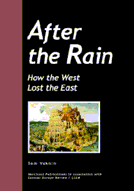Bulgaria is proof that not all currency boards are destined to an Argentine denouement, with inevitable collapse and devaluation lying ahead. Having witnessed its gross domestic product (GDP) plunge by one third between 1989 and 1997, it has risen by 11 percent in the three years since, driven by net exports and domestic demand in equal measures. This was achieved as hyperinflation was reduced to an annual rate of 1.7 percent in 1998. It has since worryingly climbed back to 11.4 percent last year and has come down to only eight percent since, due to higher energy prices and a severe drought.
Bulgaria also repaid its sovereign debt so that it now constitutes less than 70 percent of its gross domestic product. This is often attributed to strict fiscal policies (the budget deficit amounts to around one percent of official GDP and wage bills in most loss-making state enterprises have been frozen) and to a successful implementation of a currency board.
All above board
The board is very popular with the Bulgarians: it gave them a stable currency, increased exports, liquefied banks and halved interest rates, among other benefits. After years of crony privatizations ("management and employee buyouts") financed by criminal groups and followed by widespread asset stripping and a botched voucher cum investment fund scheme, more than 80 percent of bank assets and 50 percent of state enterprises have been genuinely privatized (often through the stock exchange).
A series of well-publicized and government-sponsored raids by police ands tax authorities on the likes of Multigrup, the penumbral holding company, have gone a long way towards decriminalizing the economy. And corrupt ministers are being given the boot as a matter of course. The authorities have also been making the right noises regarding health care, pensions and bank supervision. Real investment, depressed wages and restructuring led to higher productivity and enhanced competitiveness.
All sectors experienced growth. The failed transition from Communism to a market economy forced many Bulgarians to go back to agriculture. This process has reversed and re-industrialization commenced. Gross fixed investment almost doubled itself to 16 percent of GDP.
Though most foreign direct investment (FDI) comes from poor and unsophisticated non-EU countries and is plunged into labor-intensive greenfields; FDI (half of it in privatization proceeds) climbed tenfold to USD one billion. The FDI stock (with sorely needed technology, intellectual property, knowledge and management) reached USD three billion at the end of 2000.
Surprisingly, these macro-economic achievements had little effect on the business climate. Bulgarian businessmen have remained largely sceptical of the economic prospects of their country. Entrepreneurship is still obstructed by insufficient infrastructure, inefficient, arbitrage-orientated and lending-averse banks, and over-regulation (eg in the energy sector). Venal red tape deters investors.
There is no central revenue authority, for instance, and no functioning treasury system. Labor taxes are stratospheric and drive people into the thriving informal economy (estimated to be about one-third of the total). And, despite being a trading nation, Bulgarian customs duties and tariffs are both complex and high.
The lot of simple people has not discernibly improved either. Output is 30 percent below the Communist-era peak. Unemployment is high by European standards (between 16 and 18 percent). The average monthly income in southern Bulgaria (an agricultural and textile area that borders Greece) is still USD 50 or less, one of the lowest in any economy in transition. Wages are one-fourth the EU's. Cheap labor has its advantages, though. It attracts foreign direct investment (shoes and textile sweat shops) and generates foreign exchange (seasonal workers).
Slow reform
The pace of structural reform has slowed to a halt in the latter part of 2000. The presentment of important bills (such as the Energy Law) has been postponed. Lucrative but growth-retarding monopolies (from tobacco to telecommunications) have been left untouched, despite a revamped Privatization Law. Should this continue, Bulgaria may find it harder to attract the FDI that, last year, covered its gaping current account deficit (equal to six percent of GDP).
Foreign exchange reserves (at USD 3.6 billion, or almost six months of imports) are sufficient to offset a run on the lev, but rising inflation does take its toll on the competitiveness of Bulgarian products. In real terms, the lev has appreciated by 20 percent since the end of 1996 (one lev is worth one Deutschemark).






